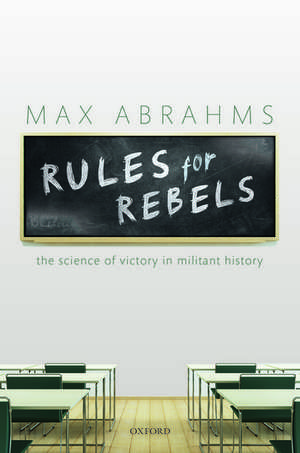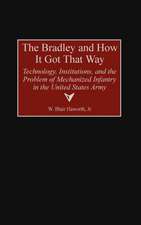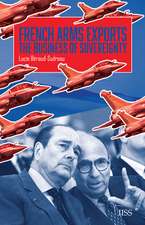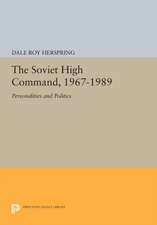Rules for Rebels: The Science of Victory in Militant History
Autor Max Abrahmsen Limba Engleză Hardback – 3 oct 2018
Preț: 336.68 lei
Preț vechi: 431.27 lei
-22% Nou
Puncte Express: 505
Preț estimativ în valută:
64.42€ • 66.46$ • 53.76£
64.42€ • 66.46$ • 53.76£
Carte disponibilă
Livrare economică 22-28 februarie
Preluare comenzi: 021 569.72.76
Specificații
ISBN-13: 9780198811558
ISBN-10: 0198811551
Pagini: 298
Dimensiuni: 164 x 242 x 26 mm
Greutate: 0.61 kg
Editura: OUP OXFORD
Colecția OUP Oxford
Locul publicării:Oxford, United Kingdom
ISBN-10: 0198811551
Pagini: 298
Dimensiuni: 164 x 242 x 26 mm
Greutate: 0.61 kg
Editura: OUP OXFORD
Colecția OUP Oxford
Locul publicării:Oxford, United Kingdom
Recenzii
Rules for Rebels gives us much valuable information about the mindsets and inner workings of specific rebel groups, but its value goes far beyond this. It should help a wide group of international policymakers and analysts, and its conclusions should be compulsory reading for Western governments and their security agencies.
Using a mix of quantitative and qualitative analyses, Abrahms shows that the deliberate killing of civilians significantly reduces a rebellion's chances of success, for at least three main reasons...There is an urgent need to shatter the mystique of civilian targeting, and this book does that very well.
Rules for Rebels is not something that terrorism scholars and policy makers can ignore.
Using a mix of quantitative and qualitative analyses, Abrahms shows that the deliberate killing of civilians significantly reduces a rebellion's chances of success, for at least three main reasons...There is an urgent need to shatter the mystique of civilian targeting, and this book does that very well.
Rules for Rebels is not something that terrorism scholars and policy makers can ignore.
Notă biografică
Dr. Max Abrahms is among the worlds leading experts on the subject of terrorism. Currently, he is a professor of political science and public policy at Northeastern University. He has held various affiliations with the Center for International Security and Cooperation at Stanford University, the Empirical Studies of Conflict project at Princeton University and Stanford University, the Dickey Center for International Understanding at Dartmouth College, the Combating Terrorism Center at West Point Military Academy, the Council on Foreign Relations, the Center for Cyber and Homeland Security at George Washington University, the Center for the Study of Terrorism in Rome, the Moshe Dayan Center at Tel Aviv University, the economics department at Bar Ilan University, the political science department at Johns Hopkins University, and the Belfer Center at Harvard University.







